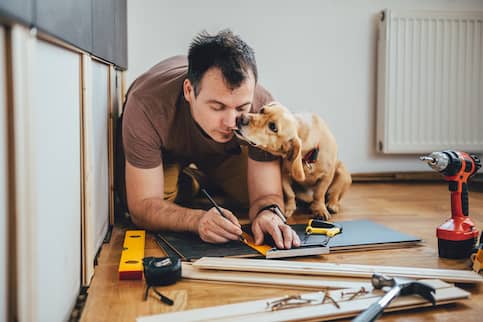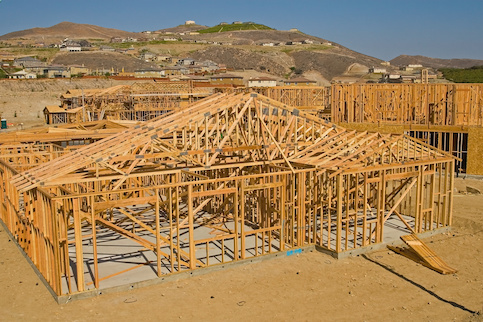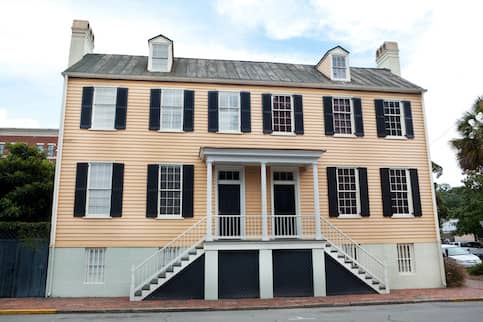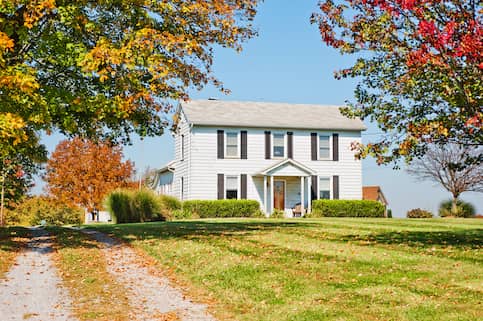Being a first-time home buyer or any kind of buyer with credit issues can affect your ability to secure a mortgage loan. In addition, challenges such as income requirements, a borrower’s low credit score and a low supply of affordable homes can keep some people from financing a home.
Fortunately, Federal Housing Administration (FHA) 203(b) and 203(k) loans can help. The federal government backs these loans, meaning lenders offer borrowers a mortgage that requires a low down payment and features a relatively modest interest rate. With a government-approved appraisal and options for financing minor home repairs, FHA 203(b) loans also ensure the borrower moves into a home in good condition.
If you’re a buyer in the market for an FHA 203(b) or 203(k) loan, this guide is designed to show you the key features of both loans so you can decide if one or the other fits your financial circumstances.
Find out if an FHA loan is right for you.
See rates, requirements and benefits.
What Is An FHA 203(b) Loan?
FHA 203(b) loan is a common mortgage among first-time home buyers looking to purchase or refinance their single-family or small multifamily home. An FHA 203(b) loan is a normal FHA loan, meaning it’s accessible to borrowers with a low income and a challenging credit history.
FHA loans often require a down payment as low as 3.5% of the purchase price, making this loan type even more accessible to borrowers. Lenders that offer FHA mortgages receive mortgage insurance payments to offset the risk that these loans incur.
See What You Qualify For
Buy A Home
Discover mortgage options that fit your unique financial needs.

Refinance
Refinance your mortgage to have more money for what matters.
Tap Into Equity
Use your home’s equity and unlock cash to achieve your goals.
FHA 203(b) Loan Requirements
To qualify for this type of loan, you’ll need to meet the following FHA 203(b) requirements:
- Credit score: You can sometimes qualify for an FHA loan with a credit score in the 500 – 579 range, but only if you put 10% down. Generally speaking, the better your credit score, the better the loan terms you’ll receive.
- Down payment: Your down payment can be 3.5% of the purchase price with a credit score of 580 or higher. Your down payment will increase to 10% with a credit score of 500 – 579, if you’re approved.
- Proof of income: You’ll need proof of 2 years of continuous employment, but there’s no specific income requirement.
- FHA-approved appraisal: The home must undergo an FHA-approved appraisal. If the appraiser stipulates certain repairs or improvements, you’ll have to complete them within 120 days.
- Mortgage insurance premiums (MIP): You’ll pay 1.75% of the loan amount at closing for upfront MIP, and then you’ll pay 0.45% to 1.05% in annual MIP. Your “annual” payment will be divided by 12 and paid each month as part of your mortgage.
Benefits Of An FHA 203(b)
FHA loans have numerous perks. They allow middle-to-low-income earners to purchase a home, they offer a relatively low interest rate and require a low minimum down payment, and you don’t need an excellent credit score to qualify. Meanwhile, the 203(b) loan, specifically, offers these benefits:
- You won’t have to wait for any repairs or take out a larger loan to cover related costs.
- The home inspection and appraisal may reveal minor issues, but you can address those with repair escrows that you roll into your loan amount. At closing, you’ll still pay less than you would for significant home improvement projects.
- The home condition standards for FHA 203(b) appraisals will give you peace of mind that you and your family are moving into a safe, secure home.
Find out if an FHA loan is right for you.
See rates, requirements and benefits.
The Difference Between FHA 203(b) Vs. 203(k) Loans
The FHA offers two 203 mortgage types: 203(b) and 203(k). Although similar in name, they have key differences. Let’s take a look at how an FHA 203(b) and 203(k) loan differ.
Types Of Home Purchase
Before you decide on the type of loan that best meets your needs, it’s important to understand which loan is most ideal for the scenario you’re in and how much work you’ll need done to the house itself.
- Move-in ready: FHA 203(b) loans help borrowers purchase a home in relatively good condition. You may have a few minor issues, but the home is essentially move-in ready.
- Fixer-upper: If the home has extensive damage and needs tens of thousands of dollars in repairs, a 203(k) loan would be appropriate since it can provide financing for the home and home improvements.
Appraisal Process
Since 203(b) and 203(k) loans have different purposes, their appraisals have separate standards. Therefore, it’s a good idea for home buyers looking for an FHA loan program to understand the differences so they can pursue the particular program that fits their situation.
- FHA 203(b) appraisal: While FHA 203(b) loan appraisals can be more stringent than conventional appraisals, they usually serve to identify problems that need addressing for a home to be move-in ready.
- FHA 203(k) appraisal: While the appraisal process for an FHA 203(k) is similar to that of an FHA 203(b) loan, the appraiser must tell the mortgage lender if they see any necessary repairs not noted in the appraisal summary. The FHA 203(k) loan combines the home value and the price of necessary repairs so the future homeowner can afford to fix and purchase the home.
Types Of Repairs Covered
Whether an FHA 203(b) or a 203(k) loan program is right for you depends largely on the extent of the repairs the house needs. Next, we’ll examine some of the repairs covered with an FHA 203(b) loan and FHA 203(k) loan.
FHA 203(b) Repairs
FHA 203(b) loans can cover these types of repairs:
- New appliances
- Fixing gutters, roofs and downspouts
- Door and window replacements
- HVAC system repair or purchase
- Electrical and plumbing repair or purchase
- Floor improvement or replacement
- Interior and exterior painting
- Weatherization, such as insulation and storm doors
- Small fixes for decks, patios and porches
- Less serious mold issues
- Basement sealing
FHA 203(k) Repairs
An FHA 203(k) loan can help a borrower who has found a home needing major repairs. Possible projects covered by a 203(k) loan cover include:
- Electrical and wiring repair
- Water damage or flooding issues
- Problematic foundation
- Excessive damage to sidewalks or driveway
- Damage from ants, termites and other pests
- Lead hazard posed through peeled or chipping paint in a home built before January 1, 1979
- Extremely dirty crawlspaces
- Appliance failure
- Unfinished renovations
- Decaying or damaged countertops
- Bare studs
The Bottom Line
Home buyers who don’t qualify for a conventional loan because of income thresholds or credit score requirements can often be approved for a mortgage through the FHA. 203(b) loans are for homes that are move-in ready or only need minor repairs. As a result, 203(b) loans don’t have tens of thousands of dollars for repair costs included with them, but repair escrows are available for minor projects.
Find out if an FHA loan is right for you.
See rates, requirements and benefits.

Ashley Kilroy
Ashley Kilroy is an experienced financial writer who writes for solo entrepreneurs as well as for Fortune 500 companies. She is a finance graduate of the University of Cincinnati. When Ashley isn’t helping people understand their finances, you may find her cage-diving with great whites or on safari in South Africa.












